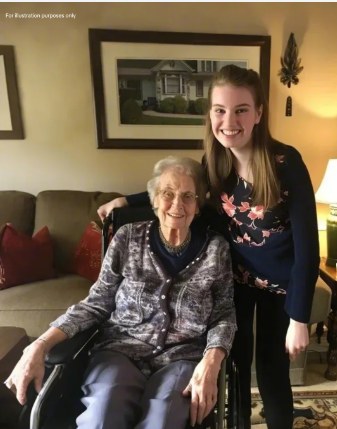For seven years, I was there for Mrs. Patterson. When I first met her, she was sitting in a tattered armchair by the window, gazing out at the world with a distant look in her eyes. Her once-beautiful home was now a place of solitude and sorrow. Her family had long since abandoned her, leaving only the occasional phone call or visit to ask for money, but never offering the love she so desperately craved.
Her relatives didn’t care about her; they just saw her as a source of wealth to exploit. Mrs. Patterson, however, was a woman full of stories, wisdom, and kindness. I never imagined that stepping into her life would fill the emptiness I had been carrying in my own heart.
We spent hours together, cooking meals, playing cards, and sharing memories. She’d tell me about her younger days, about the dreams she had and the love she had once known. I was the daughter she never had, and in many ways, she was the mother I had lost. Over the years, I came to love her deeply, and though I had no family of my own, she became my anchor, my reason for waking up every morning.
But then, a month ago, everything changed. Mrs. Patterson passed away peacefully in her sleep. I was by her side when it happened, holding her hand and whispering words of comfort, even as I knew she would never wake up again. I arranged her funeral and saw her family arrive, their expressions twisted with fake grief, their eyes constantly scanning the room, calculating how much they could inherit.
I couldn’t stay long. It was too much to bear. As soon as the funeral was over, I returned to her house, the place where I had spent so many years feeling loved. I was grieving for the loss of the woman who had become my family, but I found a small comfort in knowing she was no longer alone.
Just as I began to settle into the quiet of her home, there was a knock at my door. My heart skipped a beat. I wasn’t expecting anyone. When I opened the door, I was faced with two police officers.
“Are you the caretaker of Mrs. Patterson?” one of them asked.
I nodded, a strange sense of unease creeping up my spine.
“We need you to come with us,” the officer continued.
I stood frozen for a moment, trying to process what was happening. They escorted me to Mrs. Patterson’s house, where her entire family was waiting, their faces flushed with anger. Mrs. Patterson’s daughter, a woman who had barely paid attention to her mother in the years I had known her, pointed at me and screamed, “It’s her!”
I felt my stomach drop. The tension in the room was suffocating.
“What do you mean?” I stammered, my voice barely a whisper.
The daughter’s voice was sharp and accusatory. “You’ve been stealing from her! You’ve been taking her money for years!”
I was taken aback. “What? I—” But the words caught in my throat.
The officers stepped forward. “We have reason to believe that Mrs. Patterson’s death was not natural,” one of them said.
My heart pounded in my chest. “What are you talking about? She passed peacefully. She was old and sick.”
The daughter’s eyes gleamed with malice. “She was fine when I last saw her. It wasn’t until you started taking care of her that she started getting weaker. You’ve been poisoning her for her money, haven’t you?”
I shook my head in disbelief. “No. I loved her. I would never hurt her. You’re lying!”
But they weren’t listening. They began questioning me, accusing me of things I didn’t understand. The police had found traces of something in her system—something that suggested foul play.
As the accusations swirled around me, I felt the world tilt beneath my feet. The woman who had been my family, my everything, was gone, and now her family was trying to take away my dignity and the memory of the love I had shared with her.
The investigation continued, and though I was eventually cleared of any wrongdoing, the damage was done. I lost my peace, my trust, and the connection I had with Mrs. Patterson. But the truth was clear now: her family had been lying, twisting the story for their own benefit. They had never cared for her, never loved her.
And in the end, it wasn’t me who betrayed her—it was them.
